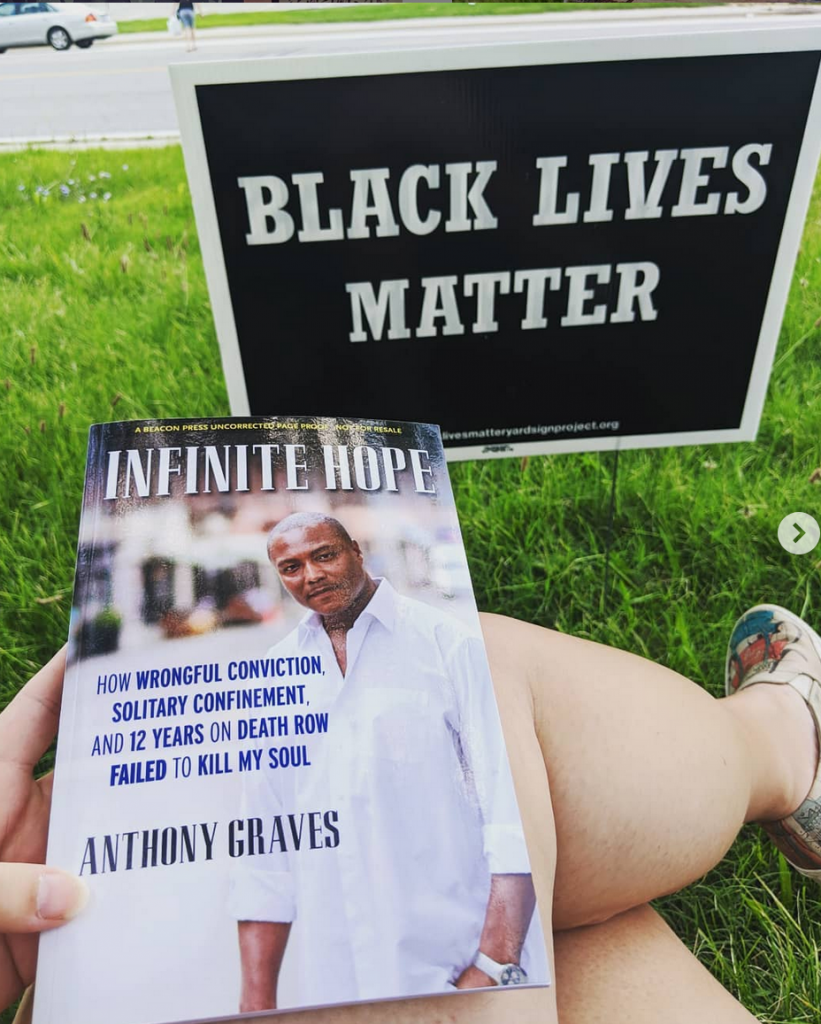I won a copy of Infinite Hope, by Anthony Graves through Goodreads. I read it during my time out solo protesting, which is something I’ve been doing for a month or so now.

Description:
In the summer of 1992, a grandmother, a teenage girl, and four children under the age of ten were beaten and stabbed to death in Somerville, Texas. The perpetrator set the house on fire to cover his tracks, deepening the heinousness of the crime and rocking the tiny community to its core. Authorities were eager to make an arrest. Five days later, Anthony Graves was in custody.
Graves, then twenty-six years old and without an attorney, was certain that his innocence was obvious. He did not know the victims, he had no knowledge about the crime, and he had an airtight alibi with witnesses. There was also no physical evidence linking him to the scene. Yet Graves was indicted, convicted of capital murder, sentenced to death, and, over the course of twelve years on death row, given two execution dates. He was not freed for eighteen years, two months, four days.
Through years of suffering the whims of rogue prosecutors, vote-hungry district attorneys, and Texas State Rangers who played by their own rules, Graves was frequently exposed to the dire realities of being poor and black in the criminal justice system. He witnessed fellow inmates who became his friends and confidants be taken away, one by one, to their deaths. And he missed out on seeing his three young sons mature into men. Graves’s only solace was his infinite hope that the state would not execute him for a crime he did not commit.
To maintain his dignity and sanity, Graves made sure as many people as possible knew about his case. He wrote letters to whomever he thought would listen. Pen pals in countries all over the world became allies, and he attracted the attention of a savvy legal team that overcame setback after setback, chiseling away at the state’s faulty case against him. Everyone’s efforts eventually worked. After Graves’s exoneration, the original prosecutor on his case was disbarred.
Review:
This was a hard book to read because the events in it are so unrelentingly wrong. I found myself wanting to avoid it. Of course, we can’t can we? If we refuse to look at injustices, how can we seek to understand and correct them? And there appear to have been incalculable injustices in Graves’ case. It would seem the prosecutors knowingly tried and convicted an innocent man. One has to ask why. Graves doesn’t even try to answer this question, maybe he can’t. Was it pure racism? He doesn’t suggest so, though it certainly played a role.
I found Graves a competent but unemotional narrator of his own tale. And while I can understand how reporting the events in a detached manner might make it easier to face in the retelling, it makes it dry to read. Plus, the book centers on the miscarried justice of Graves’ various trials and says comparatively little on the almost 20 years he spent in prison. Those are the years that would have fleshed him out as a character and made him more approachable to the reader. (I don’t mean as a fictional character but as the central component of his own story.)
All in all, I think this was worth the read and I’m glad to see Graves seems to have found a way to form good from the experience.